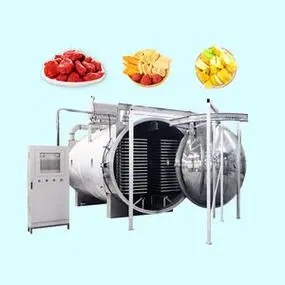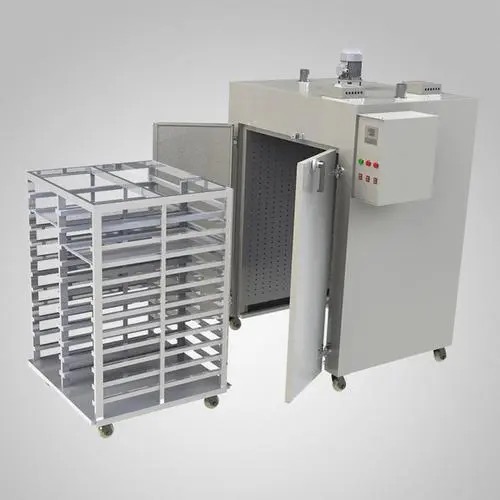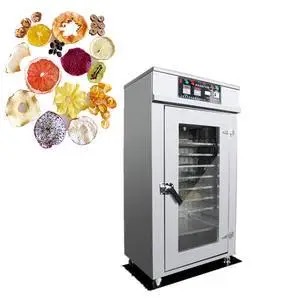
Content Menu
● Introduction: Revolutionizing Food Preservation
● Understanding Food Dehydration: The Science Behind the Process
>> How Vegetable Dryers and Food Drying Machines Work
● Types of Vegetable Dryers and Food Drying Machines
>> 1. Home Food Dehydrators
>> 2. Commercial Food Drying Machines
>> 3. Industrial Dehydration Equipment
>> 4. Solar Food Dehydrators
>> 5. Freeze Dryers
● Benefits of Using Vegetable Dryers and Food Drying Machines
● Choosing the Right Vegetable Dryer or Food Drying Machine
● Tips for Successful Food Drying
● The Future of Food Drying Technology
● Conclusion: Embracing the Power of Food Preservation
● Frequently Asked Questions
>> 1. What's the difference between a food dehydrator and a vegetable dryer?
>> 2. How long does it take to dry food in a vegetable dryer or food drying machine?
>> 3. Is it safe to leave a food drying machine running overnight?
>> 4. Can I use a vegetable dryer to make pet treats?
>> 5. How do I clean and maintain my food drying machine?
Introduction: Revolutionizing Food Preservation
In an era where health-conscious living and sustainable practices are at the forefront of our minds, the vegetable dryer and food drying machine have emerged as indispensable tools in modern kitchens. These innovative appliances, ranging from compact home food dehydrators to industrial-scale food drying machines, are transforming the way we preserve and enjoy fruits, vegetables, and herbs. This comprehensive guide will delve into the world of food dehydration, exploring the benefits, technologies, and applications of vegetable dryers and food drying machines.
Understanding Food Dehydration: The Science Behind the Process
Food dehydration is an ancient preservation technique that has been refined and modernized through the use of vegetable dryers and food drying machines. At its core, the process involves removing moisture from food items to inhibit the growth of bacteria, yeasts, and molds, thereby extending shelf life while preserving nutritional value.
How Vegetable Dryers and Food Drying Machines Work
Modern vegetable dryers and food drying machines utilize a combination of heat and air circulation to remove moisture from food. Here's a breakdown of the process:
1. Heat Application: The food drying machine generates warm air, typically between 95°F to 165°F (35°C to 74°C), depending on the type of food being dried.
2. Air Circulation: Fans within the food dehydrator circulate the warm air evenly around the food items.
3. Moisture Removal: As the warm air passes over the food, it causes the water molecules to evaporate.
4. Exhaust: The moist air is then expelled from the vegetable dryer, maintaining a constant flow of dry air.
This process continues until the desired level of dehydration is achieved, which can take anywhere from a few hours to several days, depending on the food type and the specific vegetable dryer or food drying machine being used.

Types of Vegetable Dryers and Food Drying Machines
The market offers a wide variety of vegetable dryers and food drying machines, catering to different needs and scales of operation. Let's explore some of the most popular types:
1. Home Food Dehydrators
These compact appliances are perfect for individual households or small-scale operations. They typically feature stackable trays and are ideal for making healthy snacks, drying herbs, or preserving small batches of fruits and vegetables.
2. Commercial Food Drying Machines
Designed for larger operations, commercial food drying machines offer higher capacity and more precise control over temperature and humidity. These are commonly used in restaurants, food processing facilities, and small-scale agricultural operations.
3. Industrial Dehydration Equipment
These large-scale systems are used in industrial food processing and can handle massive quantities of produce. They often incorporate advanced features like automated loading and unloading systems, precise humidity control, and energy recovery mechanisms.
4. Solar Food Dehydrators
Harnessing the power of the sun, these eco-friendly options are gaining popularity for their energy efficiency. While they may take longer to dry food compared to electric models, they are an excellent choice for sustainable living enthusiasts.
5. Freeze Dryers
Although not technically a "vegetable dryer" in the traditional sense, freeze dryers use a different technology to remove moisture from food. They freeze the food and then create a vacuum environment to sublimate the ice directly into vapor, preserving the food's structure and nutritional content.
Benefits of Using Vegetable Dryers and Food Drying Machines
The popularity of vegetable dryers and food drying machines continues to grow, and for good reason. Here are some of the key benefits:
1. Extended Shelf Life: Dehydrated foods can last for months or even years when properly stored, reducing food waste and saving money.
2. Nutritional Preservation: Unlike some other preservation methods, food drying retains most of the original nutrients in fruits and vegetables.
3. Space-Saving Storage: Dried foods take up significantly less space than their fresh counterparts, making storage more efficient.
4. Healthy Snack Options: Creating your own dried fruits and vegetables allows for healthier snacking without added preservatives or sugars.
5. Flavor Concentration: Dehydration concentrates flavors, making dried foods intensely flavorful and great for cooking.
6. Cost-Effective: Buying produce in bulk during peak season and drying it for later use can lead to significant savings.
7. Versatility: Food drying machines can be used for a wide variety of foods, from fruits and vegetables to meats and herbs.
Choosing the Right Vegetable Dryer or Food Drying Machine
Selecting the perfect vegetable dryer or food drying machine depends on several factors. Consider the following when making your choice:
1. Capacity: How much food do you plan to dry at once? This will help determine the size of the machine you need.
2. Energy Efficiency: Look for models with energy-saving features, especially if you plan to use the dryer frequently.
3. Temperature Control: More precise temperature control allows for better results with different types of foods.
4. Noise Level: Some food drying machines can be noisy, which might be a concern if you plan to run them overnight or in shared spaces.
5. Ease of Cleaning: Look for models with dishwasher-safe trays and easy-to-clean surfaces.
6. Additional Features: Some vegetable dryers come with extra features like timers, automatic shut-off, or even smart connectivity.
7. Budget: Prices can vary widely, so determine your budget and look for the best value within your price range.

Tips for Successful Food Drying
To get the most out of your vegetable dryer or food drying machine, follow these tips:
1. Prepare Foods Properly: Cut fruits and vegetables into uniform pieces to ensure even drying.
2. Pre-treat When Necessary: Some fruits benefit from pre-treatment with lemon juice or ascorbic acid to prevent browning.
3. Arrange Foods Carefully: Don't overcrowd the trays, and ensure good air circulation around each piece.
4. Rotate Trays: If your food drying machine doesn't have a fan for circulation, rotate the trays periodically for even drying.
5. Store Properly: Once dried, store foods in airtight containers in a cool, dark place to maximize shelf life.
6. Experiment: Try drying different foods and combinations to discover new flavors and textures.
The Future of Food Drying Technology
As technology advances, so do vegetable dryers and food drying machines. Some exciting developments on the horizon include:
1. Smart Connectivity: Integration with smartphone apps for remote monitoring and control.
2. Improved Energy Efficiency: New designs and materials that reduce energy consumption while maintaining or improving performance.
3. Hybrid Systems: Combinations of different drying technologies, such as convection and freeze-drying, in a single machine.
4. Automated Systems: More advanced industrial systems with fully automated loading, monitoring, and packaging processes.
5. Sustainable Materials: Development of food drying machines made from more environmentally friendly and recyclable materials.
Conclusion: Embracing the Power of Food Preservation
Vegetable dryers and food drying machines have revolutionized the way we approach food preservation. From small home kitchens to large industrial operations, these versatile appliances offer a sustainable, healthy, and cost-effective method of extending the life of our favorite fruits, vegetables, and herbs. As technology continues to advance, we can expect even more innovative features and improved efficiency in the world of food dehydration.
Whether you're looking to reduce food waste, create healthy snacks, or simply explore new culinary possibilities, a vegetable dryer or food drying machine is an investment that can transform your approach to food. By understanding the science behind the process and choosing the right equipment for your needs, you can unlock a world of flavor, nutrition, and convenience that will change the way you think about food preservation.

Frequently Asked Questions
1. What's the difference between a food dehydrator and a vegetable dryer?
Answer: The terms "food dehydrator" and "vegetable dryer" are often used interchangeably. Both refer to appliances that remove moisture from food for preservation. However, a vegetable dryer might be specifically designed or marketed for drying vegetables, while a food dehydrator is a more general term that encompasses drying all types of foods, including fruits, meats, and herbs.
2. How long does it take to dry food in a vegetable dryer or food drying machine?
Answer: The drying time can vary greatly depending on the type of food, its water content, the thickness of the slices, and the specific machine being used. Generally, fruits can take anywhere from 6 to 36 hours, vegetables 4 to 14 hours, and meats 4 to 12 hours. Always refer to your specific machine's instructions and recipes for accurate drying times.
3. Is it safe to leave a food drying machine running overnight?
Answer: Most modern food drying machines are designed to be left running for extended periods, including overnight. However, it's important to follow the manufacturer's instructions and safety guidelines. Ensure the machine is placed in a well-ventilated area away from flammable materials, and consider using a model with an automatic shut-off feature for added safety.
4. Can I use a vegetable dryer to make pet treats?
Answer: Yes, many people use vegetable dryers and food drying machines to make healthy, preservative-free treats for their pets. You can dry a variety of pet-safe fruits and vegetables, as well as meats for jerky-style treats. Always research which foods are safe for your specific pet and consult with a veterinarian if you have any concerns.
5. How do I clean and maintain my food drying machine?
Answer: Proper cleaning and maintenance are crucial for the longevity and hygiene of your food drying machine. Most machines have removable trays that can be washed with warm, soapy water or in a dishwasher if specified as dishwasher-safe. The main unit should be wiped down with a damp cloth, avoiding getting water in any electrical components. Always unplug the machine before cleaning and ensure all parts are completely dry before reassembling and using again. Refer to your specific model's user manual for detailed cleaning instructions.












